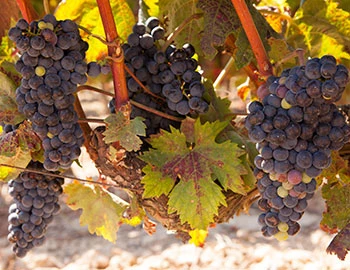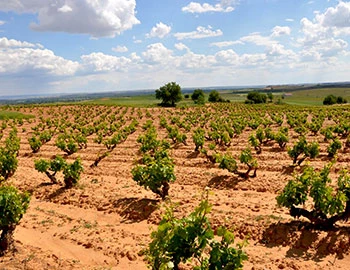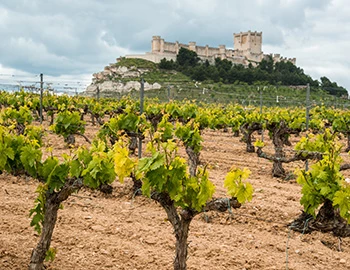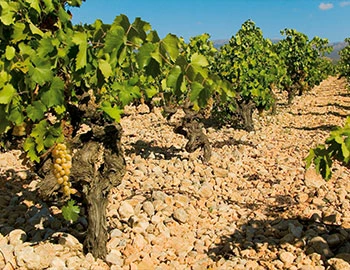
Psi by Pingus 2022
DO Ribera del Duero, Bodegas y Viñedos Alnardo S.L., 1500 ml

| Grape variety: | Tempranillo |
| Producer: | Dominio de Pingus |
| Origin: | Spain / Castilla y León / Ribera del Duero |
| Other vintages: |
Description
In the historic centre of the Ribera del Duero, Peter Sisseck's latest project came into being a good 10 years ago: the Bodegas y Viñedos Alnardo. A good 400 winegrowers with very small plots and ancient vines are involved in this unique project, in which Sisseck buys and presses their grapes for the PSI. The PSI is matured in mainly used barrels, thus bringing the full potential and typicality of this unique region into the bottle. Not only the name (the initials of Peter Sisseck), but also the style bear the unmistakable signature of the master: incredibly powerful and at the same time perfectly balanced - a wine of exceptional structure and yet for almost every day.
Attributes
| Origin: | Spain / Castilla y León / Ribera del Duero |
| Grape variety: | Tempranillo |
| Drinking temperature: | 16 to 18 °C |
| Food Pairing: | Saddle of lamb fillet with herb jus, Hearty stew with pulses, Pork fillet with plums |
| Vinification: | fermentation in cement tank |
| Maturation: | in cement tank, in used barriques |
| Maturation duration: | 18 months |
| Volume: | 14.0 % |
| Note: | Contains sulphites |
Dominio de Pingus
The first Pingus was bottled in 1995. This limited production wine from Ribera del Duero made history with a legendary rating from Robert Parker Junior (1998): "One of the greatest young red wines I have ever tasted." The vintage is also at the centre of a somewhat mythical-sounding story – the freighter carrying a quarter of the limited production sank off the Azores, with the wine ending up in Davy Jones's locker at the bottom of the sea.
Peter Sisseck, alias Pingus
Peter Sisseck, alias Pingus, was born in Copenhagen in 1962. His uncle, oenologist Peter Vinding-Diers who managed Château Rahoul in Bordeaux, awakened Peter's interest in wine at an early age. The 21-year-old subsequently learned winemaking from him.

Tempranillo
Iberian Native
The Tempranillo is the emblem of Spain. With its juicy cherry fruit, crisp tannins, and its notes of leather and spices, it gives the Rioja its face. In the Ribera del Duero, it is known as Tinta del país. Here it turns out focused and muscular. As it has inhabited the Iberian Peninsula for centuries, it is known under countless synonyms. Across the border in Portugal, it is called Tinta Roriz, and lends colour and body to port wine. It also plays an important role in the booming wine scene of the Douro Valley. The Tempranillo owes its name to its early maturity – "temprano" in Spanish means "early". Tip: do it like they do in Spain and enjoy it with lamb.

Ribera del Duero
Ribera del Duero: Spanish temperament in a glass
The Tempranillo grape yields a particularly powerful wine with ripe berry fruit and alluring spice in the Ribera del Duero region, where it is called Tinta del País. It is no wonder that the region is seen internationally as a flagship for Spanish red wines. The designation of origin was first introduced in 1982. At the time, only few wineries existed; today, there are over 270. Many premium wines come from exceptionally old vines, sometimes over 80 years old.

Castilla y León
Castile and León: Increasing diversity
Only 30 years ago, the autonomous region of Castile and León was an almost blank spot on the European wine list. This has changed immensely thanks to three grape varieties. The Tempranillo variety yields feisty, strong wines in Ribera del Duero and Toro. And Bierzo, the small wine area in the region's northwest, has experienced an impressive ascent, thanks to the character-laden Mencia variety. Finally, the fresh and fruity Verdelho pressings from Rueda have become the most successful Spanish white wines.

Spain
Spain – Variety and perfection
“Somewhere in la Mancha, in a place whose name I do not care to remember...,” begins Don Quixote's odyssey.
The most famous part is definitely when Don Quixote thinks windmills are his enemy and wants to fight them – until they nearly kill him. It’s possible there was a bit too much of the La Mancha wine at play. Spanish vines fight for their survival in rugged landscapes, battling fierce drought and rough soils. But they fight well.


